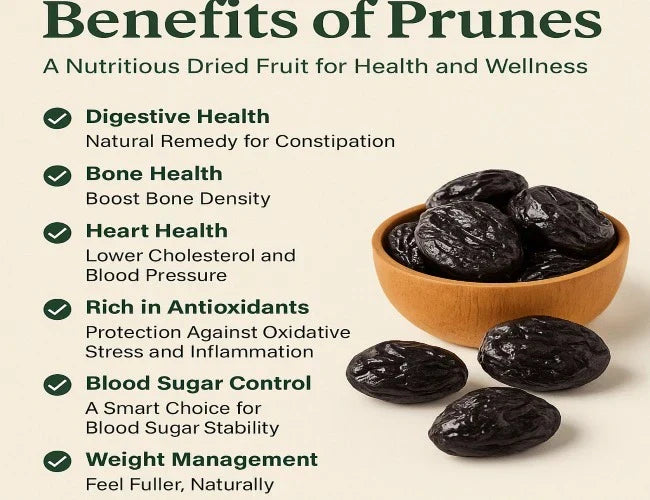Why Prunes Are Good for You?
Dried plums are called prunes. The Prunus domestica tree is the source of them. The history of prunes is lengthy. They have been consumed by humans for thousands of years. Prunes are used in many international cuisines.
In addition to being delicious, prunes are also a great source of nutrients. They are rich in minerals and vitamins. Prunes have a reputation for being healthy. The advantages of prunes as dried fruit are frequently discussed. These health advantages of prunes include supplying energy and aiding with digestion.
Nutritional Profile of Prunes (Per 100g)
|
Nutrient |
Amount |
% Daily Value |
|
Calories |
240 kcal |
12% |
|
Fiber |
7g |
28% |
|
Vitamin K |
60.5µg |
50% |
|
Vitamin A |
781 IU |
16% |
|
Potassium |
732mg |
21% |
|
Iron |
0.88mg |
5% |
|
Antioxidants |
High |
– |
1. Prunes for Digestive Health
Natural Remedy for Constipation
Prunes are rich in sorbitol and dietary fiber, which work together to improve bowel regularity:
-
Sorbitol softens stool by drawing water into the intestines.
-
Fiber adds bulk, easing stool passage.
Backed by Research
Studies show that prunes can be more effective than some laxatives in treating constipation. A daily serving of 4–5 prunes can support regular bowel movements and promote gut health naturally.
2. Prunes and Bone Health
Boost Bone Density, Especially in Postmenopausal Women
Research suggests that consuming 5–6 prunes daily may help preserve bone density, reducing the risk of osteoporosis.
-
Vitamin K: Essential for maintaining and growing bones.
-
Manganese: Aids in bone tissue formation and calcium absorption.
Regular prune consumption is a natural and simple way to support long-term bone health.
3. Heart Health Benefits of Prunes
Lower Cholesterol and Blood Pressure
Prunes' content of the following makes them good for cardiovascular health:
-
Potassium, which helps reduce blood pressure.
-
LDL (bad) cholesterol can be decreased with the use of soluble fiber.
Research says regular prune consumption with improved cholesterol profiles and reduced risk of heart disease.
4. Prunes Are Rich in Antioxidants
Protection Against Oxidative Stress and Inflammation
Prunes contain polyphenols, a type of antioxidant that:
-
Fights oxidative damage caused by free radicals.
-
Lowers the chance of developing long-term conditions like cancer and heart disease.
-
Reduces inflammation, supporting overall wellness.
5. Prunes for Blood Sugar Control
A Smart Choice for Blood Sugar Stability
Prunes have a low glycemic index despite their sweetness, which helps:
-
Slow down glucose absorption.
-
Prevent blood sugar spikes.
-
Support stable energy levels.
Prunes are also suitable in moderation for people managing diabetes.
6. Prunes for Weight Management
Feel Fuller, Naturally
The fiber in prunes promotes a feeling of fullness (satiety), which can help:
-
Reduce hunger between meals.
-
Lower total daily calorie intake.
Studies show that adding prunes to your diet can help curb appetite and support healthy weight goals.
Easy Ways to Enjoy Prunes:
-
Add to yogurt, muesli, or smoothies.
-
Use in baking (e.g., muffins or bread).
-
Enjoy as a standalone snack (4–5 prunes per serving).
7. Prunes for Healthy, Youthful Skin
Skin-Enhancing Nutrients
Prunes help improve skin health through:
-
Antioxidants: Prevent skin cell damage caused by free radicals.
-
Collagen synthesis: Maintains skin elasticity and firmness.
Regular consumption may help reduce signs of aging, leaving your skin looking smooth and radiant.
Also Read - Are Dried Dates Good for Your Health?
How to Add Prunes to Your Diet?
Here are simple and tasty ways to incorporate prunes into daily meals:
1. Smoothies: Add 2–3 prunes for natural sweetness and fiber.
2. Salads: Chop and mix in 2–4 prunes for extra flavor.
3. Healthy Snacks: Have 4–5 prunes for a quick energy boost.
4. Baking: Use about ½ cup chopped prunes in muffins or bread.
Potential Side Effects and Precautions
Here are the potential adverse effects of overconsuming prunes:
-
Digestive Discomfort: Bloating, gas, and cramping in the stomach can be caused by prunes' high sorbitol and fiber content.
-
Diarrhoea: Overeating prunes may lead to diarrhoea due to the laxative effect of sorbitol.
-
Need for Moderation: Consuming prunes in excess can result in digestive issues; moderation is key to avoiding complications.
-
Listen to Your Body: Reduce prune intake if discomfort or adverse effects occur after consumption.
-
Stay Hydrated: Drinking water can help manage digestive issues caused by prune overconsumption.
A fruit rich in nutrients, prunes have a long history and many health advantages.They support healthy digestion, heart health, bone strength, and blood sugar balance. Prunes' fibre content helps with weight management, and its antioxidants lower inflammation. Consuming prunes regularly might also provide you energy and encourage good skin.
Prunes are a flexible complement to any diet, and there are simple ways to use them in meals and snacks. To prevent adverse effects, including gastrointestinal distress, moderation is essential. People can benefit from prunes' numerous health and wellness benefits by consuming them in moderation.




Leave a comment
All comments are moderated before being published.
This site is protected by hCaptcha and the hCaptcha Privacy Policy and Terms of Service apply.